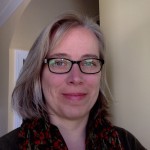Faculty Spotlight: Karey Harwood
 Tell us about yourself! Where are you from? What brought you to North Carolina/NC State?
Tell us about yourself! Where are you from? What brought you to North Carolina/NC State?
I am originally from New Jersey, but between graduate school in Atlanta and the last thirteen years in Raleigh, I have now lived in the south for almost as long as I lived in the north. I think this blended experience gives me a unique perspective on many things in American culture. I also married a native of Winston-Salem, so my appreciation for North Carolina has had many years to develop. I was hired by NC State while I was still finishing my dissertation and began teaching for what used to be called MDS (Multidisciplinary Studies) in 2003. I moved into the Department of Philosophy & Religious Studies in 2004.
What is your academic and/or professional background?
I thought seriously about going to medical school when I was in college, but became more interested in the study of ethics after working for the Council on Ethical and Judicial Affairs of the American Medical Association. My curiosity led me to Harvard Divinity School, where I was fortunate to take classes with some great professors, including Charles Hallisey, Jon Levenson, Richard Reinhold Niebuhr, Arthur Dyck and many others. These professors really broadened my perspective and taught me to think deeply. I earned a Master’s degree and nearly stayed at Harvard to complete my Ph.D., but was drawn to Emory University’s Ethics & Society program, which combines the study of ethics with the sociology of religion.
What brought you to your field of study? When/Why did you become interested in your area of study/research?
There is no shortage of interesting ethical questions in everyday life, not to mention in politics and international relations. But “bioethical” issues and issues raised by new medical technologies can be particularly riveting and personal. There is clearly something novel about the ability to freeze human eggs to postpone childbearing or the ability to pre-select the gender of one’s offspring. Nevertheless, the questions these technologies raise are as old as any we might ponder: what are the appropriate ends and limits of human freedom, what is the nature of mortality, what do we owe future generations, etc.? I continue to study bioethics because I continue to be interested in these underlying “big picture” questions and the ways that human societies have found to answer them. The study of religion has an important role to play here too, because religious values often inform the analysis and resolution of ethical problems.
What is your experience with the MALS program? What attracts you about the MALS program and teaching an interdisciplinary course? What do you feel the importance of interdisciplinarity is?
I have taught a few excellent MALS students in my classes over the years, but this fall will be my first time teaching a MALS seminar. Probably all of the courses I’ve taught at NC State have had some measure of interdisciplinarity. Bioethics is by nature an interdisciplinary field. A basic understanding of science, particularly biology, is necessary for understanding the “facts on the ground” and the ethical issues at stake. An appreciation for history, particularly the history of science and medicine, is also helpful. The Tuskegee Syphilis Study, where people were denied treatment for syphilis in the name of advancing medical knowledge, is a good example. Understanding the disease process of syphilis, the treatments that became available during the course of the study but weren’t used, the then-recent shadow of Nazi medical experiments, the Nuremberg Code, the influence of racial prejudice, the collusion of the military in the recruitment of subjects – all these factors and more are relevant for fully understanding the ethical significance of this “study,” how it was handled and why it was finally stopped.
Tell us about your current research and academic pursuits. Are there any recent accomplishments we can share?
I recently wrote an article that will be published in the journal Medicolegal and Bioethics about social egg freezing, which means freezing human eggs for a non-medical reason such as pursuing a career or seeking a suitable partner. (A medical reason to freeze one’s eggs would be preserving future fertility while undergoing chemotherapy.) This was an interesting article to write because societal attitudes about reproductive technologies seem to be in flux.
Notably, in recent years, my interests have broadened beyond bioethics to include public education and its role in a democratic society. I think I’ve been drawn to this topic because I have three sons in public schools and have taken a great interest in the political decision-making affecting public education in North Carolina. I recently gave a talk at Millbrook Baptist Church entitled, “School Choice: What Values are at Stake in Our Civic Struggles Over Education?” I have a lot more that I want to research and write about this topic and am looking forward to the MALS seminar this semester as a chance to continue the conversation.
Dr. Karey Harwood is an associate professor in the Department of Philosophy and Religious Studies and author of The Infertility Treadmill: Feminist Ethics, Personal Choice, and the Use of Reproductive Technologies (University of North Carolina Press, 2007)